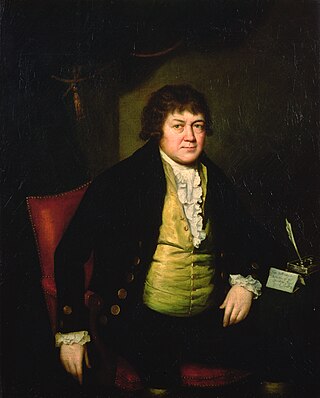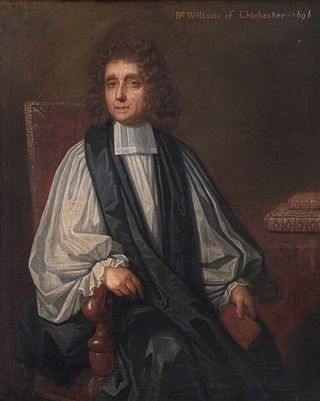Related Research Articles

The Bangorian Controversy was a theological argument within the Church of England in the early 18th century, with strong political overtones. The origins of the controversy lay in the 1716 posthumous publication of George Hickes's Constitution of the Catholic Church, and the Nature and Consequences of Schism. In it, Hickes, as Bishop of Thetford, on behalf of the minority non-juror faction that had broken away from the Church of England after the Glorious Revolution, excommunicated all but the non-juror churchmen. Benjamin Hoadly, the Bishop of Bangor, wrote a reply, Preservative against the Principles and Practices of Non-Jurors; his own Erastian position was sincerely proposed as the only test of truth.

Tate Wilkinson was an English actor and manager.

Samuel Bolton was an English clergyman and scholar, a member of the Westminster Assembly and Master of Christ's College, Cambridge.
John Allin, or John Allin (1596–1671), was an English-born Puritan cleric and one of the patriarchs of New England associated with the foundation of Dedham, Massachusetts.

John Williams was an English Bishop of Chichester.
The Lord President of Connaught was a military leader with wide-ranging powers, reaching into the civil sphere, in the English government of Connaught in Ireland, in the sixteenth and seventeenth centuries. The office was created in 1569, and in 1604 was reconstituted with full powers to hear all civil suits, to impose martial law and to proceed with "fire and sword" against the King's enemies. The width of his powers gave rise to clashes with the longer established courts: in 1622 he and the Lord President of Munster were ordered not to "intermeddle' in cases which were properly within the remit of those courts. He was assisted by a council whose members included the Chief Justice of Connacht, one or two associate justices and the Attorney General for the Province of Connacht. The office was abolished in 1672.
William Coward (1648–1738) was a London merchant in the Jamaica trade, remembered for his support of Dissenters, particularly his educational philanthropy.
The Spalding Club was the name of three successive antiquarian and text publication societies founded in Aberdeen, which published scholarly editions of texts and archaeological studies relevant to the history of Aberdeenshire and its region. The clubs were named after the 17th-century historian John Spalding.
Giles Collier (1622–1678), was an English divine.

The Chief Baron of the Irish Exchequer was the Baron (judge) who presided over the Irish Court of Exchequer. This was a mirror of the equivalent court in England, and was one of the four courts which sat in the building in Dublin which is still called The Four Courts.
Peter Gooden was an English Roman Catholic priest, who came to prominence as a controversialist during the reign of James II.
Charles William Glover was an English violinist and composer.
The Socinian controversy in the Church of England was a theological argument on christology carried out by English theologians for around a decade from 1687. Positions that had remained largely dormant since the death in 1662 of John Biddle, an early Unitarian, were revived and discussed, in pamphlet literature.
Caleb Fleming, D.D. was an English dissenting minister and polemicist.
William Goode the younger (1801–1868) was an English cleric, a leader of the evangelicals of the Church of England and from 1860 the Dean of Ripon.
Augustine Bernher was a priest in England.
John Isham (1680?–1726) was an English composer and organist.
References
- ↑ "Proceedings of the Liverpool Literary and Philosophical Society". 1870.
- ↑ . Dictionary of National Biography . London: Smith, Elder & Co. 1885–1900.
- ↑ . Dictionary of National Biography . London: Smith, Elder & Co. 1885–1900.
. Dictionary of National Biography . London: Smith, Elder & Co. 1885–1900.